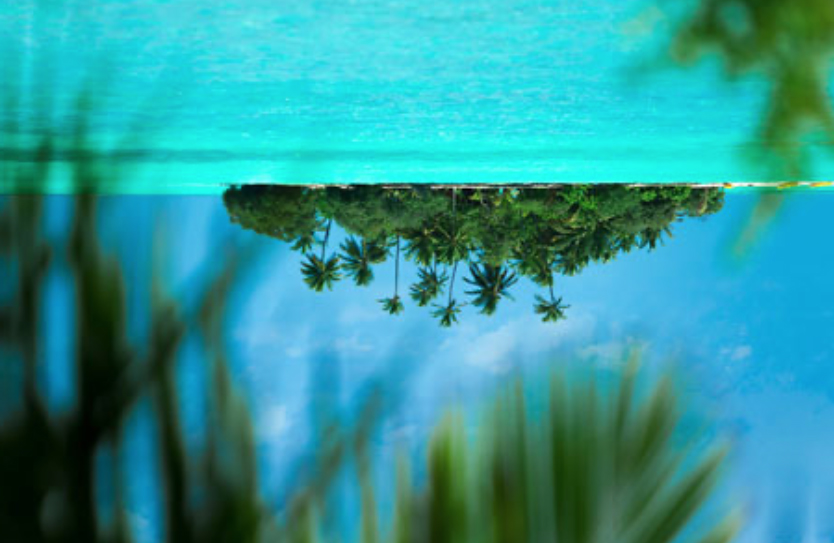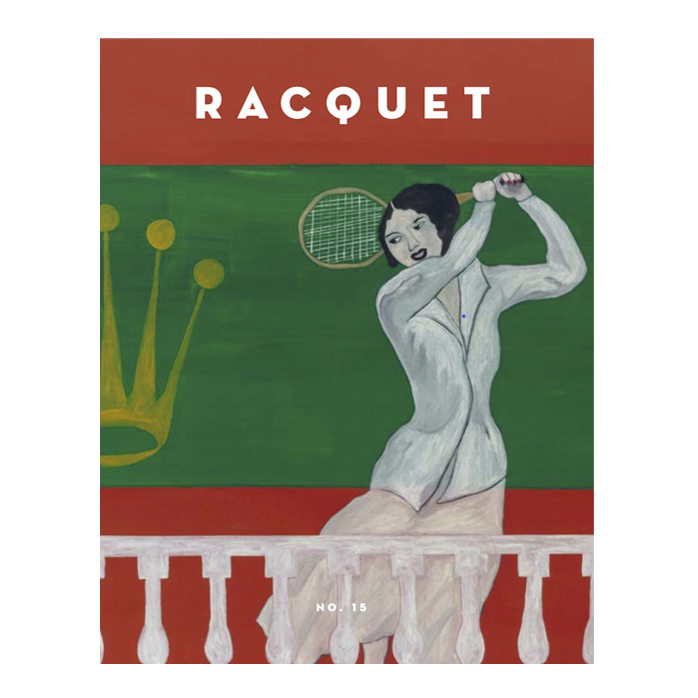By Andrea Petkovic
For our readers who may be wishing they could escape to a tropical paradise for the holidays, this dispatch from the Maldives, which appeared in Racquet No. 14, could make you think twice.
The sea lay soft and blue and wide before my eyes. The sky was a perfect azure and I had to squint to squeeze copious sunlight out of my eyes. I was on an island in the Maldives. Paradise on earth. Hell on earth. It was January 2012, the time of the Australian Open, and while my peers were in a different kind of sun, sweating a different kind of sweat, I tossed and turned on a sunbed in my perspiration of laziness.
I had been diagnosed with a stress fracture in my lower back exactly six days before the Australian Open began. I had had pain in my lower back for months and finally went to the doctor after I couldn’t get out of bed in the morning any longer. In my mind I can still see the doctor’s wrinkles at the corners of his mouth and how they moved when he talked, performing a weird dance of bad news delivered in reassuring tones. I was the ninth-best tennis player in the world at the time, and with a decent performance I could have cracked the top five. Could have, would have, should have.
I returned home the next day to see my doctor in Germany for a second opinion, booking a flight back to Melbourne at the airport for a week later in case he gave me better news than Mister Wrinklemouth. Despite a cocktail of emotions—sadness, anger, relief—I did manage the presence of mind to book a refundable ticket. My lower back hurt intensely on the flight back to Germany, and I felt sad and sorry for myself, angry at the doctor (I always shoot the messenger!), and strangely relieved from the burden of pressure that apparently comes with being really good at something.
After my doctor at home doubled down on the stress-fracture diagnosis, he asked me plainly: “What do you plan on doing now?”
“Can you call Klaus, my physio? I brought all my stuff to go straight to rehab from here.”
He laughed softly (at me?). “Andrea, your sacroiliac joint is practically broken. You don’t need rehab, you need to plant your ass in salty ocean water somewhere where the weather’s always good. That’s all you can do right now.”
It made me think: I should go on a vacation, alone, turn off my phone, alone, think things through, alone, find myself. Eat Pray Love for beginners without the actual chore of challenging myself. Eff that. I wanted to relish the feeling of relief I briefly experienced when told I couldn’t play in Melbourne. I also wanted to question it. I could use some time to think.
I booked one ticket—alone, ALONE!—to the Maldives, of all places. I had remembered the countless conversations I had had with my peers when the season would draw to a close.
“Where are you headed for vacation?” Polite smile.
“The Maldives.” Bright stars shining through cold eyes, dreamy expression, gaze toward the future.
“Oh, I’ve never been. Is it cool?” Uncomfortable nonchalance.
“You’ve never been?!” Shocked panic as if me not going would mean they for some reason weren’t allowed to go either. “Andrea, you have to go, it’s the most beautiful place in the world. Here, I’ll text you the name of the resort we always go to,” a colleague told me.
Was it, though? The most beautiful place in the world. Sure, I guess: It had sandy beaches, sunsets, the crystal-clear sea teeming with marine life. The stuff of the ideal aspirational holiday. New York City has always been more my style, rats and all. I had never understood the obsession with the Maldives, especially among tennis players. When the season was over, all I wanted to do was get away from that world I lived in, if only for the three weeks of vacation we were granted. The others, it seemed to me, were magically, subconsciously pulled back to each other, couldn’t let go of each other. They all raced to the Maldives, and I would stare at their vacation photos and the “what a coincidence” captions on social media, shaking my head. They spoke of resort names and islands as though they were trying to defeat each other in their private lives too. Didn’t they want to get away too?
It didn’t help that I hated the beach. I didn’t like my body, I sure didn’t like it in a bikini, and I was tired of the “Are you a swimmer?” questions because of my wide frame and muscular back. I didn’t like the sun, I didn’t like swimming, I didn’t like nature. And I didn’t like tennis players, all factors that disqualified the Maldives from my vacation list in a heartbeat.
Mind you, that was then. I was an arrogant, pretentious, I’m-not-one-of-them kind of gal who thought vacationing in the Maldives was a nouveau riche manifestation of what wealth is supposed to be. I still think that. But I also think that the opposite—going somewhere “real” to explore an “authentic” lifestyle—is just as phony if not phonier. A tourist is a tourist is a tourist and will remain a tourist. There’s nothing to be done about that except for accepting it.
Now that tennis was taken away from me, I wanted nothing more than to belong. So, I did the closest thing to belonging I could find in a moment of crisis and booked a trip to the one place I never wanted to see. I had once fallen asleep to a documentary on the trash problem in the Maldives and something about rising water levels, so I booked my stay in a sustainable resort that used only materials that grew in the area and vegetables and fruits from their own garden. I paid thrice the price for a good feeling and an idea that logically and pragmatically should have been the cheapest option of all, but then again, a guilty conscience had never been quantifiable.

And now I was here. I should have felt free and alive, but I felt trapped and dead inside. When I went for a walk around the island I would be back at square one after 20 minutes, an endless boring circle. I would lie awake at night, jet-lagged, listening to the tides change around my wooden cottage built on poles right above the ocean. I would turn on the TV, see the bright blue Australian Open courts flicker, and turn it off again. It didn’t matter that I was in paradise, when my mind wanted to be in hell (and trust me, a Grand Slam is hell), paradise and hell inverted.
A recent news article on a newlywed couple trapped in the Maldives during the COVID-19 pandemic, unable to get out, resorts closing down on them, hopping from island to island in heavy rains during monsoon season, brought back vivid memories that felt like a heated piece of lead had fallen into my stomach, stopping all possible digesting systems at once.
I quickly developed a routine. Developing a routine is my go-to coping mechanism when something is bothering me, when I feel unwell, when my own skin seems to be the wrong fit for my body. I set my alarm, I got up in the morning, I went to breakfast. I stared at pineapple-eating couples in comfortable silences with each other on their honeymoons (and shudder now when I think of the hundreds of newlyweds stranded in the Maldives when the pandemic nixed their return flights). I went for a 30-minute swim in the pool, the only “activity” I was allowed to do with my broken back—oh, the irony, I was a swimmer now. I went for walks around the island. Everything looked the same.
The homegrown garden looked puny, and it was hard to believe that all the vegetables and fruits came from here. The palms bored me. Occasionally I would run into other people, but mostly not. The premise of this island was built around loneliness, a pretend synergy of man and nature. And when I had exhausted all possible activities for the day, I would sit on a sun lounger and stare at the sea, an eerie dread growing inside of me, pushing my organs to the sides. I would sit in a position that only mildly hurt my back, and obsess over points and rankings and weeks to come. Sometimes I cried from self-pity, which is the worst kind of crying. It’s the kind that does not make you feel better after you’ve done it.
I could see the beauty of this place, but I couldn’t feel it. I understood why people would want to come here, and I hated myself for not being able to enjoy the simple pleasures in life. After I had spent enough time sobbing and crying behind my sunglasses, hating the island, hating the loneliness, hating the never-ending sunrises and sunsets with their red spectrum colors, it became very clear to me all of a sudden: I didn’t really hate those things. I didn’t hate beaches and fruity cocktails and my beautiful tennis colleagues who had it all. I hated myself. I couldn’t just sit there and enjoy the fact that my only worry at this moment should have been the amount of tip you insert at the end of your trip underneath the bill. (Seriously, though, what is the ballpark percentage people tip in a remote island nation?) I had to make it all about myself and my pride and my all-encompassing self-loathing. I realized one thing: The Maldives were neither good nor bad. They were a psychedelic drug. A good place in life gave you a good trip. A bad place in life gave you a bad trip. In this case, literally. I left two days early, breathing a sigh of relief when I saw the gray skies and low-hanging clouds of end-of-January Germany.
The Maldives: Three stars out of 10; would not recommend. I’d have given it two were it not for a baby-shark sighting on my last day.



